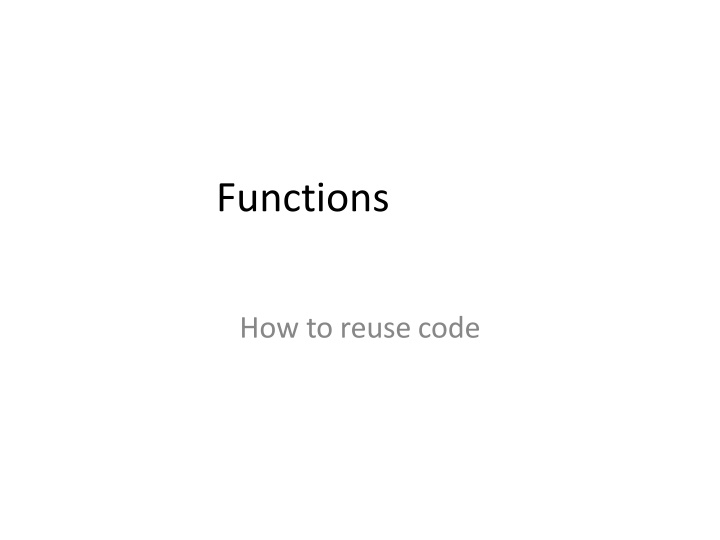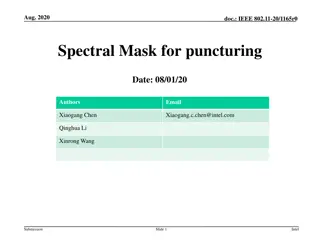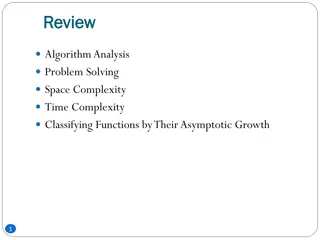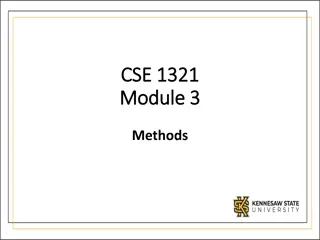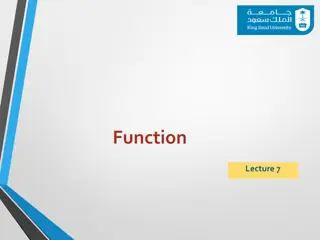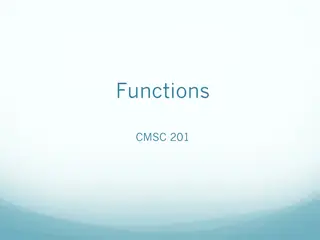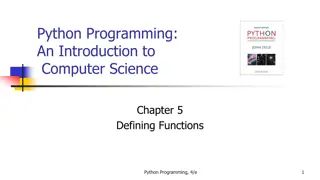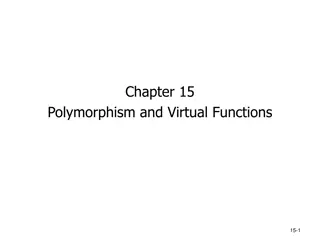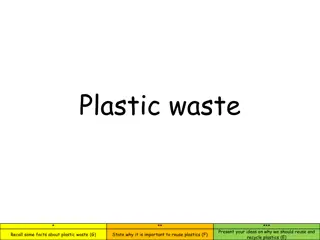Reusing Code Efficiently with Functions in C++
Learn how to efficiently reuse code in C++ by implementing functions for repetitive tasks. Explore examples of raising integers to arbitrary powers and see how functions make the code more modular, readable, and maintainable. Discover the power of abstraction and code organization through practical illustrations.
Download Presentation

Please find below an Image/Link to download the presentation.
The content on the website is provided AS IS for your information and personal use only. It may not be sold, licensed, or shared on other websites without obtaining consent from the author.If you encounter any issues during the download, it is possible that the publisher has removed the file from their server.
You are allowed to download the files provided on this website for personal or commercial use, subject to the condition that they are used lawfully. All files are the property of their respective owners.
The content on the website is provided AS IS for your information and personal use only. It may not be sold, licensed, or shared on other websites without obtaining consent from the author.
E N D
Presentation Transcript
Functions How to reuse code
#include <iostream> using namespace std; int main() { int threeExpFour = 1; for (int i = 0; i < 4; i = i + 1) { threeExpFour = threeExpFour * 3; } cout << "3^4 is " << threeExpFour << endl; return 0; }
#include <iostream> using namespace std; Copy-paste coding int main() { int threeExpFour = 1; for (int i = 0; i < 4; i = i + 1) { threeExpFour = threeExpFour * 3; } cout << "3^4 is " << threeExpFour << endl; int sixExpFive = 1; for (int i = 0; i < 5; i = i + 1) { sixExpFive = sixExpFive * 6; } cout << "6^5 is " << sixExpFive << endl; return 0; }
#include <iostream> using namespace std; Copy-paste coding (bad) int main() { int threeExpFour = 1; for (int i = 0; i < 4; i = i + 1) { threeExpFour = threeExpFour * 3; } cout << "3^4 is " << threeExpFour << endl; int sixExpFive = 1; for (int i = 0; i < 5; i = i + 1) { sixExpFive = sixExpFive * 6; } cout << "6^5 is " << sixExpFive << endl; int twelveExpTen = 1; for (int i = 0; i < 10; i = i + 1) { twelveExpTen = twelveExpTen * 12; } cout << "12^10 is " << twelveExpTen << endl; return 0; }
Witha function #include <iostream> using namespace std; // some code which raises an arbitrary integer // to an arbitrary power int main() { int threeExpFour = raiseToPower(3, 4); cout << "3^4 is " << threeExpFour << endl; return 0; }
Witha function #include <iostream> using namespace std; // some code which raises an arbitrary integer // to an arbitrary power int main() { int threeExpFour = raiseToPower(3, 4); cout << "3^4 is " << threeExpFour << endl; int sixExpFive = raiseToPower(6, 5); cout << "6^5 is " << sixExpFive << endl; return 0; }
Witha function #include <iostream> using namespace std; // some code which raises an arbitrary integer // to an arbitrary power int main() { int threeExpFour = raiseToPower(3, 4); cout << "3^4 is " << threeExpFour << endl; int sixExpFive = raiseToPower(6, 5); cout << "6^5 is " << sixExpFive << endl; int twelveExpTen = raiseToPower(12, 10); cout << "12^10 is " << twelveExpTen << endl; return 0; }
Why define your own functions? Readability: sqrt(5) is clearer than copy-pasting in an algorithm to compute the square root Maintainability: To change the algorithm, just change the function (vs changing it everywhere you ever used it) Code reuse: Lets other people use algorithms you ve implemented
Function Declaration Syntax Functionname int raiseToPower(int base, int exponent) { int result = 1; for (int i = 0; i < exponent; i = i + 1) { result = result * base; } return result; }
Function Declaration Syntax Returntype int raiseToPower(int base, int exponent) { int result = 1; for (int i = 0; i < exponent; i = i + 1) { result = result * base; } return result; }
Function Declaration Syntax Argument1 int raiseToPower(int base, int exponent) { int result = 1; for (int i = 0; i < exponent; i = i + 1) { result = result * base; } return result; } Argument order matters: raiseToPower(2,3) is 2^3=8 raiseToPower(3,2) is 3^2=9
Function Declaration Syntax Argument2 int raiseToPower(int base, int exponent) { int result = 1; for (int i = 0; i < exponent; i = i + 1) { result = result * base; } return result; } Argument order matters: raiseToPower(2,3) is 2^3=8 raiseToPower(3,2) is 3^2=9
Function Declaration Syntax int raiseToPower(int base, int exponent) { int result = 1; for (int i = 0; i < exponent; i = i + 1) { result = result * base; } return result; } signature
Function Declaration Syntax int raiseToPower(int base, int exponent) { int result = 1; for (int i = 0; i < exponent; i = i + 1) { result = result * base; } return result; } body
Function Declaration Syntax int raiseToPower(int base, int exponent) { int result = 1; for (int i = 0; i < exponent; i = i + 1) { result = result * base; } return result; } Return statement
#include <iostream> using namespace std; int raiseToPower(int base, int exponent) { int result = 1; for (int i = 0; i < exponent; i = i + 1) { result = result * base; } return result; } Function declaration Functioninvocation int main() { int threeExpFour = raiseToPower(3, 4); cout << "3^4 is " << threeExpFour << endl; return 0; }
Returning a value Up to one value may be returned; it must be the same type as the returntype. int foo() { return "hello"; // error } char* foo() { return "hello"; // ok }
Returning a value Up to one value may be returned; it must be the same type as the returntype. If no values are returned, give the function a void return type void printNumber(int num) { cout << "number is " << num << endl; } int main() { printNumber(4); // number is 4 return 0; }
Returning a value Up to one value may be returned; it must be the same type as the returntype. If no values are returned, give the function a void return type Note that you cannot declare a variable of typevoid int main() { void x; // ERROR return 0; }
Returning a value Return statements don t necessarily need to be at the end. Function returns as soon as a return statement isexecuted. void printNumberIfEven(int num) { if (num % 2 == 1) { cout << "odd number" << endl; return; } cout << "even number; number is " << num << endl; } int main() { int x = 4; printNumberIfEven(x); // even number; number is 3 int y = 5; printNumberIfEven(y); // odd number }
Argument TypeMatters void printOnNewLine(int x) { cout << x << endl; } printOnNewLine(3) works printOnNewLine("hello") will notcompile
Argument TypeMatters void printOnNewLine(char *x) { cout << x << endl; } printOnNewLine(3) will not compile printOnNewLine("hello") works
Argument TypeMatters void printOnNewLine(int x) { cout << x << endl; } void printOnNewLine(char *x) { cout << x << endl; } printOnNewLine(3) works printOnNewLine("hello") also works
Function declarations need to occur before invocations int foo() { return bar()*2; // ERROR - bar hasn t been declared yet } int bar() { return 3; }
Function declarations need to occur before invocations Solution 1: reorder function declarations int bar() { return 3; } int foo() { return bar()*2; // ok }
Function declarations need to occur before invocations Solution 1: reorder function declarations Solution 2: use a function prototype; informs the compiler you ll implement itlater int bar(); functionprototype int foo() { return bar()*2; // ok } int bar() { return 3; }
Function prototypes should match the signature of the method, though argument names don t matter int square(int); functionprototype int cube(int x) { return x*square(x); } int square(int x) { return x*x; }
Function prototypes should match the signature of the method, though argument names don t matter int square(int x); functionprototype int cube(int x) { return x*square(x); } int square(int x) { return x*x; }
Function prototypes should match the signature of the method, though argument names don t matter int square(int z); functionprototype int cube(int x) { return x*square(x); } int square(int x) { return x*x; }
Function prototypes are generally put into separate headerfiles Separates specification of the function from its implementation // myLib.h - header // contains prototypes // myLib.cpp - implementation #include "myLib.h" int square(int); int cube (int); int cube(int x) { return x*square(x); } int square(int x) { return x*x; }
Global Variables How many times is function foo() called? Use a global variable to determine this. Can be accessed from any function int numCalls = 0; Globalvariable void foo() { ++numCalls; } int main() { foo(); foo(); foo(); cout << numCalls << endl; // 3 }
int numCalls = 0; Scope int raiseToPower(int base, int exponent) { numCalls = numCalls + 1; int result = 1; for (int i = 0; i < exponent; i = i + 1) { result = result * base; } return result; can be accessed from} Scope: where a variable was declared, determines where it numCalls has global scope can be accessed from any function result has function scope each function can have its own separate variable namedresult int max(int num1, int num2) { numCalls = numCalls + 1; int result; if (num1 > num2) { result = num1; } else { result = num2; } return result; }
Pass by value vs by reference So far we ve been passing everything by value makes a copy of the variable; changes to the variable within the function don t occur outside the function // pass-by-value void increment(int a) { a = a + 1; cout << "a in increment " << a << endl; } Output int main() { int q = 3; increment(q); // does nothing cout << "q in main " << q << endl; } a in increment4 q in main3
Pass by value vs by reference main function scope q=3 // pass-by-value void increment(int a) { a = a + 1; cout << "a in increment " << a << endl; } Output int main() { int q = 3; // HERE increment(q); // does nothing cout << "q in main " << q << endl; } a in increment4 q in main3
Pass by value vs by reference main function scope increment function scope a=3 q=3 // pass-by-value void increment(int a) { // HERE a = a + 1; cout << "a in increment " << a << endl; } Output int main() { int q = 3; increment(q); // does nothing cout << "q in main " << q << endl; } a in increment4 q in main3
Pass by value vs by reference main function scope increment function scope q=3 a=4 // pass-by-value void increment(int a) { a = a + 1; // HERE cout << "a in increment " << a << endl; } Output int main() { int q = 3; increment(q); // does nothing cout << "q in main " << q << endl; } a in increment4 q in main3
Pass by value vs by reference If you want to modify the original variable as opposed to making a copy, pass the variable by reference (int &a instead of int a) // pass-by-value void increment(int &a) { a = a + 1; cout << "a in increment " << a << endl; } Output int main() { int q = 3; increment(q); // works cout << "q in main " << q << endl; } a in increment4 q in main4
Pass by value vs by reference main function scope q=3 // pass-by-value void increment(int &a) { a = a + 1; cout << "a in increment " << a << endl; } Output int main() { int q = 3; // HERE increment(q); // works cout << "q in main " << q << endl; } a in increment4 q in main4
Pass by value vs by reference main function scope increment function scope q=3 a // pass-by-value void increment(int &a) { // HERE a = a + 1; cout << "a in increment " << a << endl; } Output int main() { int q = 3; increment(q); // works cout << "q in main " << q << endl; } a in increment4 q in main4
Pass by value vs by reference main function scope increment function scope q=4 a // pass-by-value void increment(int &a) { a = a + 1; // HERE cout << "a in increment " << a << endl; } Output int main() { int q = 3; increment(q); // works cout << "q in main " << q << endl; } a in increment4 q in main4
ImplementingSwap void swap(int &a, int &b) { int t = a; a = b; b = t; } int main() { int q = 3; int r = 5; swap(q, r); cout << "q " << q << endl; // q 5 cout << "r " << r << endl; // r 3 }
ImplementingSwap void swap(int &a, int &b) { int t = a; a = b; b = t; } main function scope q=3 r=5 int main() { int q = 3; int r = 5; // HERE swap(q, r); cout << "q " << q << endl; // q 5 cout << "r " << r << endl; // r 3 }
ImplementingSwap void swap(int &a, int &b) { // HERE int t = a; a = b; b = t; } main function scope q=3 r=5 int main() { int q = 3; int r = 5; swap(q, r); cout << "q " << q << endl; // q 5 cout << "r " << r << endl; // r 3 } swap function scope a b
ImplementingSwap void swap(int &a, int &b) { int t = a; // HERE a = b; b = t; } main function scope q=3 r=5 int main() { int q = 3; int r = 5; swap(q, r); cout << "q " << q << endl; // q 5 cout << "r " << r << endl; // r 3 } swap function scope a b t=3
ImplementingSwap void swap(int &a, int &b) { int t = a; a = b; // HERE b = t; } main function scope q=5 r=5 int main() { int q = 3; int r = 5; swap(q, r); cout << "q " << q << endl; // q 5 cout << "r " << r << endl; // r 3 } swap function scope a b t=3
ImplementingSwap void swap(int &a, int &b) { int t = a; a = b; b = t; // HERE } main function scope q=5 r=3 int main() { int q = 3; int r = 5; swap(q, r); cout << "q " << q << endl; // q 5 cout << "r " << r << endl; // r 3 } swap function scope a b t=3
Returning multiple values The return statement only allows you to return 1 value. Passing output variables by reference overcomes this limitation. int divide(int numerator, int denominator, int &remainder) { remainder = numerator % denominator; return numerator / denominator; } int main() { int num = 14; int den = 4; int rem; int result = divide(num, den, rem); cout << result << "*" << den << "+" << rem << "=" << num << endl; // 3*4+2=12 }
Libraries Libraries are generally distributed as the header file containing the prototypes, and a binary .dll/.so file containing the (compiled) implementation Don t need to share your .cpp code // myLib.h header // contains prototypes double squareRoot(double num); myLib.dll
Library user only needs to know the function prototypes (in the header file), not the implementation source code (inthe .cppfile) The Linker (part of the compiler) takes care of locating the implementation of functions in the .dll file at compile time // myLib.h header // contains prototypes double squareRoot(double num); myLib.dll // libraryUser.cpp some other guy s code #include "myLib.h" double fourthRoot(double num) { return squareRoot(squareRoot(num)); }
Final Notes You don t actually need to implement raiseToPower and squareRoot yourself; cmath (part of the standard library) contains functions pow and sqrt #include <cmath> double fourthRoot(double num) { return sqrt(sqrt(num)); }
